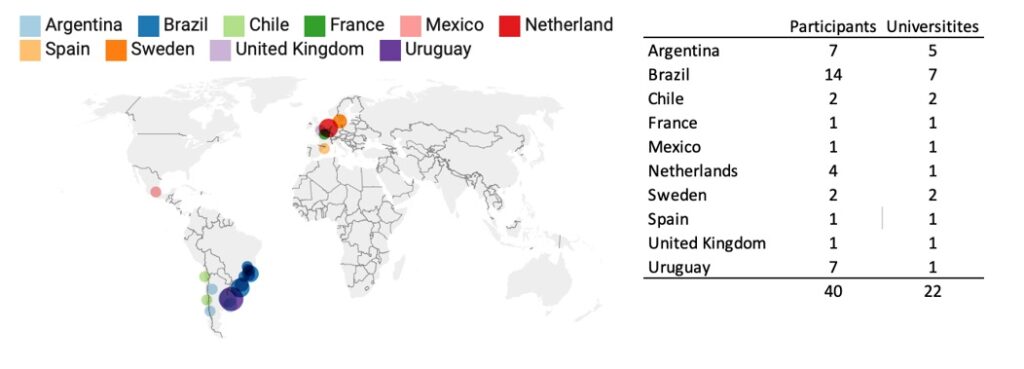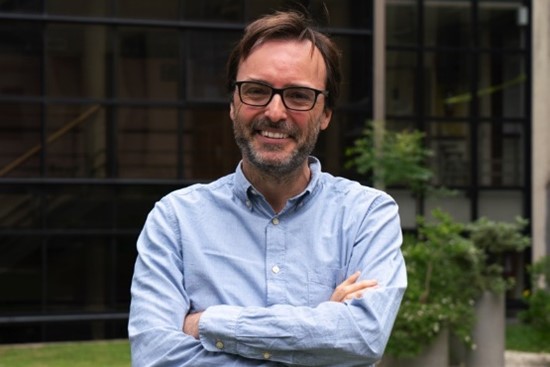RESEARCH NETWORK TITLE: Knowledge, Innovation and Regional Development in South America (KIRDSA)
EVENT TITLE: International conference on regional development in South America: empowering knowledge flows and collaboration networks
DATE AND PLACE OF EVENT: February 7, 8, and 9, 2024, Montevideo, Uruguay.
ORGANISER(S)’ NAME(S): Andrea Belmartino, Pablo Galaso and Sergio Palomeque
What was the aim of this event?
The International Conference on Regional Development in South America aimed to bring together researchers focusing on creating and disseminating knowledge in the South American context, emphasizing development processes with a territorial approach in the region’s countries. While researchers at various career stages participated, the conference also aimed to provide a dedicated space for young scholars from the region. To achieve this, we received support from the YSI.
The event presented discussions on various topics, including innovation and development in territories specializing in extractive industries, collaboration networks in innovation processes, productive specialization and technological diversification in South American regions, local development, clusters, and industrial districts, environmental challenges and green transitions, migration dynamics, and the role of cities as poles of development, innovation, and inequality. The conference aimed to foster a multidisciplinary dialogue, encouraging theoretical contributions, methodological innovations, and empirical studies. Proposals presenting implications for designing public policies for innovation and regional development in South American countries were mainly discussed, reflecting the conference’s broader goal of empowering knowledge flows and regional collaboration networks.
How many people (speakers and delegates) attended the event?
During the conference, 39 papers were presented, selected from among the 70 submissions received following the call for papers. To present these 39 papers, 40 researchers from 10 countries and 22 universities participated in the conference. The distribution of countries and universities of these participants can be seen in the following figure. Additionally, the dean of the Faculty of Economics attended the congress, along with four policymakers from countries in the region, who comprised the closing panel on public policy (see the program below). In total, 45 speakers and delegates attended the event.

Figure 1. KIRDSA Participants’ affiliation
Program and outline of the event
The conference program was designed to offer diverse sessions, workshops, and keynote presentations to address various facets of South America’s regional development. Sessions included paper presentations, panel discussions, workshops, and keynote addresses, providing ample opportunities for participants to engage with cutting-edge research and exchange ideas. Notable sessions included seminars on economic complexity, skills, and racial inequality in Brazil, as well as workshops focusing on paper development and innovation in open-source software. Additionally, parallel sessions delved into specific topics such as regional specialization, urban innovation ecosystems, and sustainable development strategies. The program also sought to provide space for sessions dedicated specifically to young scholars, integrating these sessions with others open to established researchers, fostering a dynamic and inclusive academic environment. This program, including details about the venue, social activities, useful links, and a map, was distributed via QR code instead of being printed to reduce the event’s environmental impact.
Below is a copy of the program.
Social activities organised as part of the event
In addition to its academic program, the conference offered participants a range of social activities designed to foster informal networking, cultural exchange, and community building.
- On the first day, an early social gathering took place at Tinkal, a typical chivito restaurant located along the waterfront of the Río de la Plata, just 200 meters from the faculty.
- The second day, attendees ventured to the municipal velodrome to witness a traditional Uruguayan Carnival spectacle. Here, participants were treated to outdoor performances by local murga groups, humorists, and candombe.
- The highlight of the social activities was the social dinner held on the third day at a typical parrilla restaurant located at the Mercado Ferrando.
- In addition to these planned activities, attendees had the opportunity to experience Montevideo’s vibrant Carnival atmosphere by attending the Desfile de Llamadas on Friday night. Many attendees joined in the festivities, dancing to the beat of the drums and immersing themselves in the local culture.
- A WhatsApp group was created to facilitate communication among participants. This chat remained active throughout the event and in the days following, allowing participants to share links, locations, photos, and announcements.
- Furthermore, a contest for the best x-tweet related to the event was organized, encouraging participants to interact on social media platforms.
Conclusions of the Event: Advancing Regional Studies
This conference significantly advanced the objectives of the KIRDSA research network. Through diverse sessions and workshops, the conference promoted education and stimulated research in regional studies. Keynote presentations by renowned scholars such as Ron Boschma, Dominik Hartmann and Sergio Petralia showcased the latest advancements in the field, contributing to intellectual leadership. Parallel sessions and mentorship workshops provided platforms for knowledge exchange, supporting the development of members and fostering collaboration within the community.
The conference delivered high-quality regional research, covering topics like economic complexity, innovation ecosystems, and research collaboration networks. These contributions expanded our understanding of regional dynamics and laid the groundwork for future investigations. Influence on policy debate and practice emerged as another significant outcome of the event. Roundtable discussions, such as the one chaired by Adrián Rodríguez Miranda and Carlos Bianchi, brought together policymakers, academics, and industry experts to deliberate on key challenges facing Latin American regions. By bridging research and policy, the conference aimed to inform evidence-based decision-making and promote sustainable regional development initiatives. Finally, emphasizing innovation in publishing, the conference encouraged novel approaches to disseminating research outcomes. Interactive workshops and paper development sessions aimed at young scholars explored creative avenues for communication, ensuring widespread access to knowledge.
In conclusion, the International Conference on Regional Development in South America has been instrumental in advancing the goals of KIRDSA. By promoting education, stimulating research, fostering collaboration, influencing policy, and innovating in publishing, the event has made significant strides toward addressing the complex challenges facing South American regions.
Future actions (planned events, outputs, follow-up of the event, publications)
During the conference, discussions were held regarding the organization of the second KIRDSA event. Meetings were conducted with potential collaborators, and as a result, the date and location of the second event will be announced in the coming weeks. Additionally, opportunities have emerged to organize additional events in collaboration with participants, further expanding the reach and impact of KIRDSA activities.
In terms of publications, efforts are underway to submit a book proposal for the RSA Routledge Regions and Cities Book Series. The book will draw from a selection of papers presented at the conference, covering various topics related to knowledge creation and dissemination in the South American context. Identified works that align with the book’s theme will be further developed, and discussions regarding the submission and peer review process have been initiated.
Furthermore, the KIRDSA network is exploring the possibility of preparing a particular issue for the journal Regional Studies. While this initiative is in the planning stages, the network is confident in potential contributors’ responses, given the high quality of submissions received and the promising outlook for future events.
Finally, the research network’s mailing list will be updated, including all conference participants, to keep them informed about upcoming events and news related to KIRDSA. This will ensure ongoing engagement and communication within the network.
Promotion and follow-up actions (please outline below how you promoted the Association at your event and whether any follow-up actions are planned.)
In the opening session of the conference, it was highlighted that the Association received support from the RSA, emphasizing the collaborative relationship between the two organizations. In this session, Prof. Ron Boschma encouraged attendees to apply for RSA funding opportunities, such as the MeRSA and Research Network Grant, underlining the RSA’s interest in incorporating projects and researchers from the Latin American region. Information about these funding opportunities was shared in the conference’s WhatsApp group to ensure widespread dissemination among participants.
Looking ahead, it was announced during the conference that KIRDSA research network will organize a second event next year, with details to be published soon. Furthermore, it was revealed that a book will be published by the RSA featuring papers presented at the KIRDSA 2024 event, providing further opportunities for dissemination and recognition of the Association’s work.
Additionally, the X-Twitter contest held during the event served as the association’s promotional tool, helping to spread the word about the conference among researchers who may have participated or expressed interest in attending future events. This social media engagement contributed to increasing the visibility of KIRDSA and RSA within the academic community.
Overall, these promotional efforts aim to strengthen the Association’s presence within the academic community and foster ongoing collaboration and engagement with the RSA and its affiliated networks.
The authors of this report
Andrea Belmartino

She is a PhD Student in urban studies and Regional Science at GSSI, with a BA in Economics. She is also a research assistant at Universidad Nacional de Mar del Plata. MA in Economics from Universidad Nacional de La Plata. Her research focuses on resilience, development, and sustainability, with a particular focus on Latin America.
Pablo Galaso

PhD in Economics from Universidad Autónoma de Madrid. Former Lecturer at UAM (2007-2013), now Associate Professor at Universidad de la República. His research interests include network analysis, innovation, and economic development. He is active in collaborative projects and publications in these fields.
Sergio Palomeque

PhD student in Economics at the University of Buenos Aires, lectures at the Institute of Economics, UDELAR. An active member of the Uruguayan System of Researchers, focusing on social network analysis, innovation, and economic geography. Publishes and collaborates extensively, teaching undergraduate and postgraduate courses.
More information
Program of the event
International conference on regional development in South America: empowering knowledge flows and collaboration networks
Wednesday, 7th February 2024
- 11:00-12:00: Registration
- 12:00-13:00: Room 3 | IECON – YSI Seminar
- Speaker: Dominik Hartmann (Federal University of Santa Catarina)
- Title: Economic complexity, skills, and racial inequality in Brazil
- 13:00-14:00: Lunch
- 14:00-16:00: Room 3 | YSI – Paper Development Workshop
- Speakers:
- Anabel Marín (IDS, CENIT, UK)
- Carlos Bianchi (UDELAR)
- Speakers:
- 16:00-16:30: Coffee break
- 16:30-18:00: Room 3 | Development Group Seminar – IECON
- Speaker: Sergio Petralia (Utrecht University)
- Title: Committing to Innovate: Decoding Complementarity in OSS
Thursday, 8th February 2024
- 08:00-09:00: Registration
- 09:00-09:30: Room 308 | Opening remarks
- Speakers:
- Prof. Jorge Xavier (Dean of the Faculty of Economics and Administration – Udelar)
- KIRDSA Organisers
- Speakers:
- 09:30-11:00: Parallel sessions
- Session 1.1 (Room 306 | Chair: Benjamin Cornejo-Costas):
- Veronica Amarante: Research collaboration in Development Economics. Understanding patterns of publications
- Benjamin Cornejo-Costas: Migrant inventors and their role as agents of structural change in Latin American regions
- Sarah Ferreira: Bridging university and industry: learning by hiring, collaboration with gatekeepers and its effects on patenting
- Session 1.2 (Room 307 | Chair: Diana Prelorenzo):
- Gaston Cayssials: Population Growth and Economic Performance in Mexico: Clustering and Panel Causality-Cointegration Approaches
- Diego de Vasconcelos Souza: Índice de desenvolvimento sustentável para municípios: uma análise da zona costeira do rio grande do sul
- Diana Prelorenzo: Regional specialization and economic development Empirical evidence from the Mexican economy
- Henry Willebald: Location of agricultural production and economic geography. Uruguay in the long-run (1870-2008)
- Session 1.1 (Room 306 | Chair: Benjamin Cornejo-Costas):
- 11:00-11:30: Coffee break
- 11:30-13:00: Parallel sessions
- Session 2.1 (Room 306 | Chair: Sergio Palomeque):
- Dominik Hartmann: How skills-related local labor markets shape occupational upward mobility prospects
- Sergio Palomeque: Cities’ knowledge base: internal absorptive capacities and external collaboration complementarity
- Felipe Smolski: Effects of economic complexity and relatedness on income inequality in Brazilian microregions
- Session 2.2 (Room 307 | Chair: Florencia Fiorentin):
- Franco Arandia Arzabe: Business Model Innovation factors of Small and Medium-sized Enterprises. Insights from Interactive Learning Spaces in Bolivia.
- Florencia Fiorentin: Productive paths, technological intensity and economic performance in Argentina.
- Jazmin Olivares Ugarte: Innovation in Rural Regions: The Role for Universities in Developing Interactive Learning Spaces
- Aurora Zen: Dynamics of Urban Innovation Ecosystems in Developing Countries: A Comparative Study
- Session 2.1 (Room 306 | Chair: Sergio Palomeque):
- 13:00-14:00: Lunch
- 14:00-16:00: Room 306 | YSI Session – Mentor: Anabel Marin | Chair: Andrea Belmartino
- Speakers:
- Nathalia Alves: How do global south firms engage in pharmaceutical innovation networks? Lessons from Brazil.
- Ana Baptista: Should competitiveness rankings consider gender gaps? An analysis for Brazilian municipalities
- Florencia Fiorentin: Gender gaps in the peer review process in S&T funding. The case of PICT in Argentina (2019-2020).
- Natalia Ibarra: Diseño de una estrategia de transferencia tecnológica para dispositivos sensorizados en servicios de telerrehabilitación y telemonitoreo para Centro Tecnológico en Universidad pública de Chile.
- Jazmin Olivares Ugarte: Application of journey maps for the innovation in the development of technologies. Case of family greenhouse for a rural community in Bolivia.
- Speakers:
- 16:00-16:30: Coffee break
- 16:30-18:00: Room 308 | Keynote speaker:
- Speaker: Ron Boschma (Utrecht University, University of Stavanger)
- Title: An evolutionary approach to development traps in European regions
Friday, 9th February 2024
- 09:00-11:00: Room 306 | YSI Session – Mentor: Dominik Hartmann | Chair: Igor Tupy
- Speakers:
- Danielle Carvalho: Influence of Technological and Industrial Density on Intermediate and Immediate Regions from Brazil: An Investigation of Different Types of Innovations
- Sergio De Raco: Comparing Portraits of Skill Relatedness Networks
- Caio Fernandes: An application of the Regional Development Trap index to a developing country: does local capabilities matter?
- Jordana Silva: Transformability to overcome the lock-in of the production structure: the case of Brazil’s regressive economic resilience
- Speakers:
- 11:00-11:30: Coffee break
- 11:30-13:00: Parallel sessions
- Session 3.1 (Room 306 | Chair: Eduardo Hernández-Rodríguez):
- Diego de Vasconcelos Souza: Configuration and Dynamics of Proximities: A Case Study on the Articulation Among Actors within the Framework of Productive Development Partnerships in Brazil
- Eduardo Hernández-Rodríguez: Technological change throughout Global Value Chains: The consequences of functional GVC specialization in the Global South vs the Global North
- Jose Peres-Cajías: Productivity Chains in Bolivia. How much knowledge is created?
- Session 3.2 (Room 307 | Chair: Pablo Galaso):
- Martin Arias-Loyola: Multiscalar bargaining within (neo)extractive geographies: insights from the Chilean case
- Pablo Galaso: Environmental Challenges and Innovative Responses of Local Agri-food Systems: a Theoretical Approach and Research Agenda
- Ariel Lutenberg: Espacios colaborativos para la innovación en el sector agroalimentario: hacia un mapeo regional que apoye la propuesta del Living Lab Uruguay
- Gabriela Starobinsky: Emergencia del cannabis medicinal en el Noroeste Argentino (NOA): avances y desafíos de gestión y articulación de Agrogenética Riojana
- Session 3.1 (Room 306 | Chair: Eduardo Hernández-Rodríguez):
- 13:00-14:00: Lunch
- 14-15:30: Parallel sessions
- Session 4.1 (Room 306 | Chair: Suelene Mascarini)
- Carlos Bianchi: University patents in a peripheral system: from individual-led initiatives to an institutionalized project
- Renato Garcia: Inward FDI spillovers and regional innovation: what is the role played by the local absorptive capacity?
- Suelene Mascarini: The effects of transnational and complementary linkages on technological specialization in Brazilian regions
- Fernando Mesquita:Innovation and Urban Centrality in a Digital Era: central flows in the Brazilian State of Santa Catarina
- Session 4.2 (Room 307 | Chair: Andrés Niembro)
- Daniela Calá: Cambio estructural regional en Argentina: conceptualización y medición a nivel de áreas económicas locales (1996-2019)
- Gabriela Starobinsky: El desarrollo de bioinsumos como camino hacia una especialización sostenible: capacidades, oportunidades y recomendaciones de políticas para argentina
- 16-16:30: Coffee break
- 16:30-18: Room: 308 | Round table of Policy Makers
- Supported by Núcleo Interdisciplinario de Estudios de Desarrollo Territorial (NIEDT), Espacio Interdisciplinario – UDELAR.
- Chairs: Adrián Rodríguez Miranda and Carlos Bianchi (UDELAR)
- Title: Can Academia, the Market, the State, and Civil Society Collaborate to Foster Innovation in Latin America?
- Panelists: Diego García Da Rosa (Development Manager, National Development Agency, Uruguay), Patricia Gutti (Universidad Nacional de Quilmes), Fernando Peirano (Former President of the National Agency for the Promotion of Research, Technological Development and Innovation, Argentina), Miguel Sierra (Innovation Manager, National Institute of Agricultural Research, Uruguay)
- 18-18:30: Room: 308 | Closing remarks
- Jorge Xavier (Dean of the Faculty of Economics and Administration – Udelar)
- KIRDSA Organisers
- 19:30: Social Dinner | Mostrador Parrilla at Mercado Ferrando
- 21:30: Desfile de Llamadas (optative but highly recommended)
- Session 4.1 (Room 306 | Chair: Suelene Mascarini)



